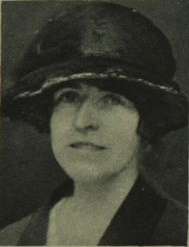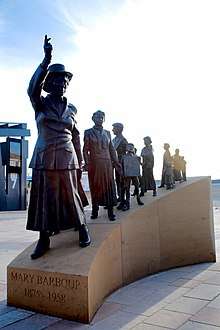Agnes Dollan
Agnes Johnston Dollan MBE (née Moir; 16 August 1887 – 16 July 1966), also known as Agnes, Lady Dollan, was a Scottish suffragette and political activist. She was a leading campaigner during the Glasgow Rent Strikes, and a founding organiser of the Women's Peace Crusade. In 1919, she was the first woman selected by the Labour party to stand for election to Glasgow Town Council, and later became Lady Provost of Glasgow.[1][2]
Lady Agnes Dollan MBE | |
|---|---|
 Dollan in 1924 | |
| Born | Agnes Johnston Moir 16 August 1887 |
| Died | 16 July 1966 (aged 78) Glasgow Victoria Infirmary, Glasgow, Scotland |
| Nationality | British |
| Political party | Independent Labour Party, Labour Party, Scottish Socialist Party |
| Spouse(s) | Patrick Dollan |
| Children | 1 |
| Parent(s) | Anne (née Wilkinson) and Henry Moir |
| Awards | Member of the Order of the British Empire (awarded 1946) |
Early life
Dollan was born on Springburn Road in Springburn, Glasgow on 16 August 1887 to Anne Wilkinson and Henry Moir, a blacksmith in the locomotive works.[3] She was one of eleven children.[4]
She attended school locally until the age of eleven before being forced to leave due to family poverty.[5] She also attended the Socialist Sunday Schools, where she "graduated as a Socialist".[6]
On leaving school, she went first to work in a factory before becoming a Post Office telephone operator.[4][7] During this latter job, she joined the Women's Labour League and assisted Mary Reid Macarthur in creating a women's post office trade union.[5]
She joined the Independent Labour Party (ILP) aged 18, and then the Women's Social and Political Union.[5]
She met Patrick Dollan, a journalist and member of the Independent Labour Party, via the Clarion Scouts.[2] They were married on 20 September 1912, and their only child, James, was born in 1913. He was exempted from religious instruction at school. James also became a journalist.[8]
Rent strikes and Red Clydeside
Agnes Dollan became politically active during the Red Clydeside period of Glasgow's history as an organiser of the 1915 Glasgow Rent Strikes alongside Mary Barbour, Helen Crawfurd, Mary Laird and Mary Jeff.[9] She worked to link the rent strikes movement with peace campaigns,[1] and as Treasurer of Glasgow Women's Housing Association led the campaign against rent increases imposed by landlords.[10][11] Dollan was jailed briefly in 1917 for protesting against high rents.[5] She was a member of The Women's Peace Crusade in Glasgow. [12]

She became a prominent figure in Glasgow politics and spoke at the 1917 May Day demo in Glasgow Green.[1]
She was a member of the Women's Social and Political Union and the Women's Labour League.
Political career
After joining the Independent Labour Party around 1915,[5] Dollan became the first female Labour candidate to stand for election to Glasgow City Council in January 1919.[1] [13]On 13 December 1921, she was elected in a by-election as the councillor for Springburn. She successfully stood again for Council in 1922[14] and held the position until 1928. She became a Justice of the Peace in 1928. [15]
During 1924, she wrote in The Sunday Post about the amendment of the Representation of the People Act 1918, clearly linking domestic interests as a good reason for all women to have the franchise. [16]
She was the first Labour candidate to contest Dumfriesshire in the United Kingdom general election of 1924 however she was unsuccessful.[17][18]
She served on the Labour Party National Executive from 1922 to 1928 and resumed her seat in the 1930s after a period of illness prevented her from participating in political activities. In 1933, she spoke at the National Conference of Labour Women, arguing that there should be more women candidates for the Labour Party.
I am convinced that our women are as good as the men, and better in some cases.[19]
She fought against the removal of the ILP from the Labour Party, however following the split she was appointed the first president of the Scottish Socialist Party's women's council in 1933.[5] She campaigned to be the Labour Party (UK) candidate for Leith in the 1935 United Kingdom general election. Her key discussion points were the prospect of another war, the Unemployment Bill, and "poverty in the midst of plenty". [20][21] The election was ultimately contested by David Cleghorn Thomson.
Her husband Patrick served as Lord Provost of Glasgow from 1938 to 1941 however when she attended events with him Agnes retained her own identity.[22]
Harry McShane wrote in his autobiography:
Pat Dollan's wife was very active and, I always thought, better than he was; I'm convinced he killed her activity.[23].
Anti-war activism
Alongside Helen Crawfurd and others, she established both the Women's Peace Crusade in 1916[2] and the Glasgow branch of the Women's International League in 1915. Both noted speakers, Dollan and Crawfurd travelled around Scotland spreading the word about the League.
She took exception to the defence of women being used as a reason for war.
With regard to the honour of women, as a woman, she objected to that being made an excuse for such a diabolical slaughter. She protested against her honour being made an excuse for war.[24]
In 1922, Dollan and Mary Barbour spoke in Langside, discussing "the Citizenship of women and bearing on world peace, disarmament, and international justice and freedom".[25]
Dollan later modified her anti-war stance in response to World War II, stating that:
It was all very well to theorise under normal conditions but we were not living under such conditions today - we were facing a crisis which might mean general mobilisation.[5]
She later became a member of the Moral Re-Armament Movement.[1]
Honours
She was awarded an MBE in George VI's Birthday Honours list of 1946 for her war efforts as the centre organiser in Glasgow for the Women's Voluntary Services.[26]
Death
Agnes Dollan died of heart failure on 16 July 1966 in Glasgow's Victoria Infirmary.[8]
References
- Ewan, Elizabeth L.; Innes, Sue; Reynolds, Sian; Pipes, Rose (8 March 2006). The Biographical Dictionary of Scottish Women. Edinburgh University Press. ISBN 978-0-7486-2660-1.
- Craig, Maggie (2011). When the Clyde ran red. Edinburgh: Mainstream. p. 219. ISBN 978-1-84596-735-2.
- "Red Clydeside: Election address of Agnes Dollan, Labour candidate for Springburn ward, page 1". gdl.cdlr.strath.ac.uk. Retrieved 9 January 2016.
- June Hannam; Karen Hunt (12 November 2012). Socialist Women: Britain, 1880s to 1920s. Routledge. p. 51. ISBN 978-1-134-76667-3.
- "Agnes Dollan". www.oxforddnb.com. Retrieved 9 January 2016.
- "A minor boadicea". The Scotsman. 14 October 1924.
- "Phone Call That Linked Me With World Famed Murder Mystery". The Sunday Post. 22 January 1939.
- "Lady Dollan: Active Socialist Worker". The Glasgow Herald. 18 July 1966. p. 7. Retrieved 9 January 2016.
- Bambery, Chris (2014). A People's History of Scotland. London: Verso. p. 189. ISBN 978-1-78-168284-5.
- Darling, Elizabeth; Whitworth, Lesley, eds. (2007). Women and the making of built space in England, 1870–1950. Aldershot [u.a.]: Ashgate. p. 116. ISBN 978-0-7546-5185-7. Retrieved 9 January 2016.
- Melling, Joseph (1983). Rent Strikes: People's Struggle for Housing in West Scotland 1890-1916.
- "Glasgow Women and Peace". Worker's Dreadnought. 20 December 1915.
- Dollan, Patrick (1923). History of the Kinning Park Co-operative Society Limited.
- "Municipal election: Many contests in Glasgow: Opposition to Labour". The Glasgow Herald. 2 October 1922. p. 6. Retrieved 9 January 2016.
- "New JPs for the City of Glasgow". The Scotman. 3 January 1928.
- "Duchess of Atholl criticised: Giving the vote to tinkers". The Sunday Post. 2 March 1924.
- "Dumfriesshire: Party activity". The Glasgow Herald. 4 May 1929. p. 5. Retrieved 9 January 2016.
- "Declarations To-Day". The Times (43796). London. 30 October 1924. col 4, p. 8.
- "Women as candidates". Birmingham Gazette. 24 March 1933.
- "Training courses: Unemployment Bill Proposal: Mrs Dollan's Criticism". The Scotsman. 1 February 1934.
- "The Issue at Leith: Mrs Dollan's Socialist Message". Edinburgh Evening News. 27 November 1933.
- "An Editorial Diary: No Lady Provost". The Glasgow Herald. 25 May 1940. p. 4. Retrieved 9 January 2016.
- McShane, Harry; Smith, Joan (1978). Harry McShane: No Mean Fighter. Pluto Press. p. 34. ISBN 978-0904383294.
- "A Woman's View on the War". Glasgow Herald. 30 January 1918.
- "Summer Meetings, 1922". Forward. 10 June 1922.
- "Second Supplement to the London Gazette of Tuesday the 18th of June 1946". The London Gazette. 18 June 1946. Retrieved 29 March 2018.
.jpg)